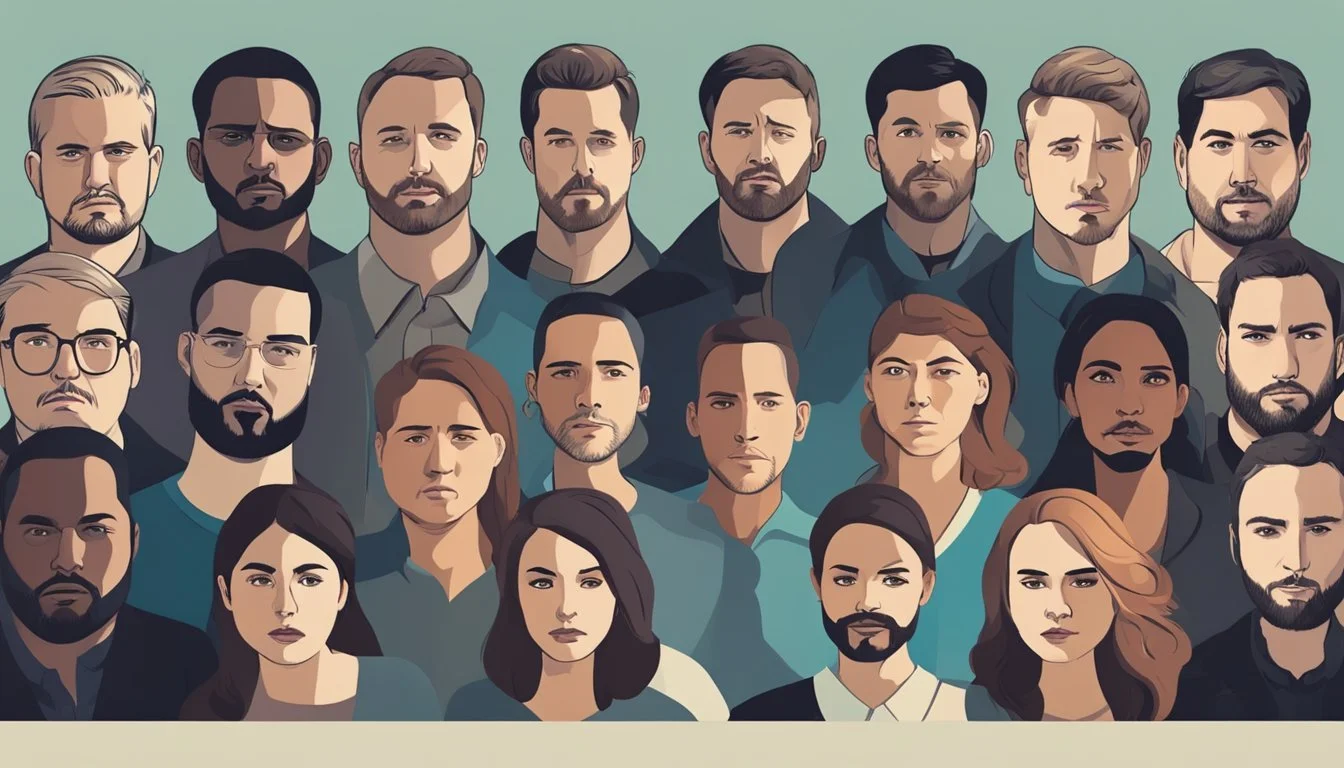12 Celebrities Who Have Opened Up About Their PTSD Struggles
Inspiring Stories of Resilience
Post-Traumatic Stress Disorder (PTSD) affects people from all walks of life, including those in the public eye. Celebrities often face immense pressure and scrutiny, making their candid discussions about mental health particularly impactful. Learning from their experiences can provide valuable insights and support for others grappling with PTSD.
This article explores a selection of celebrities who have chosen to speak openly about their struggles with PTSD. Their stories highlight both the challenges they have faced and the paths they have taken toward healing. These narratives aim to shed light on PTSD and offer hope to those who might be dealing with similar experiences.
1) Selena Gomez
Selena Gomez has been open about her struggles with Post Traumatic Stress Disorder (PTSD).
In sharing her experiences, Gomez has highlighted her battle with anxiety and depression, which are often linked to PTSD.
She has spoken about the importance of mental health, revealing that she sought therapy and support to manage her condition.
Gomez has been an advocate for mental health awareness, using her platform to encourage others to seek help.
Her candidness aims to break the stigma surrounding mental health struggles and provide hope to those facing similar challenges.
Her journey underscores the importance of addressing mental health issues openly and honestly.
To learn more about Selena Gomez's story, you can visit this detailed article.
2) Dwayne 'The Rock' Johnson
Dwayne "The Rock" Johnson has been vocal about his mental health struggles, including experiences related to depression and witnessing traumatic events. His candidness offers inspiration and support to many.
Johnson faced severe stress and depression as a teenager after witnessing his mother's suicide attempt, a deeply traumatic event. This incident had a lasting impact on him.
After his football career ended and following his divorce, Johnson again battled depression. Despite his public image of strength, he has openly discussed these mental health challenges.
By sharing his story, Johnson highlights the importance of addressing mental health issues. His transparency helps reduce the stigma surrounding mental health, especially among men. For more details on his journey, you can read from Allure or ABC News.
3) Lady Gaga
Lady Gaga has been vocal about her battle with post-traumatic stress disorder (PTSD). Her journey with PTSD began after she was raped at the age of 19. Since then, she has used her platform to raise awareness about mental health issues.
Gaga shared her experiences in various interviews and public appearances. She discussed how PTSD affects her daily life and the challenges she faces. In a powerful letter, she described her struggles with trauma and its impact on her mental health (Mashable).
Speaking with Oprah, Lady Gaga revealed that her PTSD and fibromyalgia might be connected. Her openness has shed light on the importance of mental health and the need for support (Teen Vogue).
Lady Gaga’s candid discussions about her mental health journey have resonated with many. She emphasizes the importance of seeking help and the value of therapy and medication. By sharing her story, she continues to inspire others who may be facing similar challenges (Today).
4) Prince Harry
Prince Harry has been vocal about his struggles with PTSD following the tragic death of his mother, Princess Diana, when he was just 12 years old. This profound loss took a significant toll on his mental health.
In numerous public appearances and interviews, Harry has shared his experiences, including undergoing Eye Movement Desensitization and Reprocessing (EMDR) therapy. EMDR is a technique used to help individuals process and overcome traumatic memories.
Harry has also discussed how the pressure of his royal role and constant media scrutiny compounded his difficulties. He described how for many years, he suppressed his emotions, which only worsened his mental health challenges.
His openness has helped to shed light on the importance of mental health support and the realities of living with PTSD. Harry's story is a testament to the impact of acknowledging and addressing mental health issues, no matter one’s background or status.
For more on Harry's journey, you can read about how Meghan Markle's support played a crucial role in his healing process.
5) Ariana Grande
Ariana Grande has been candid about her mental health struggles, particularly her experience with PTSD and anxiety.
After the tragic bombing at her Manchester concert in 2017, Grande developed PTSD. This horrific event had a profound impact on her mental health.
On social media, she has shared insights into her condition. Notably, she posted a brain scan image highlighting her high levels of PTSD. This visual representation shed light on the severity of her struggle.
Grande has also spoken about how these mental health challenges affect her daily life. Performing can be both therapeutic and a source of anxiety for her.
By openly discussing her battle with PTSD, Grande contributes to breaking the stigma surrounding mental health. She encourages others to seek help and prioritize their mental well-being.
Her story is a reminder that PTSD can affect anyone, regardless of their public persona. Celebrities, like everyone else, can face significant mental health challenges.
More details can be found in her People interview and her Seventeen feature.
6) Kanye West
Kanye West has been very candid about his mental health challenges, particularly his struggles with bipolar disorder and PTSD.
In a 3.5-hour interview on the Drink Champs podcast, he spoke openly about his mental health battles. West's openness has sparked important conversations about mental health in the entertainment industry.
Kanye's public discussions often highlight the impact of his diagnosis on his career and personal life. His transparency offers a glimpse into the complexities of living with PTSD and bipolar disorder.
Fans have seen Kanye’s highs and lows through his music and public appearances. By sharing his experience, he aims to reduce the stigma surrounding mental health issues.
More details on Kanye West's mental health can be accessed through his interview on the Drink Champs podcast.
7) Demi Lovato
Demi Lovato has been open about her struggles with mental health, including PTSD. She has discussed how her PTSD stems from both personal experiences and the pressures of fame.
Lovato first shared her diagnosis after years of dealing with various mental health issues. She emphasized the importance of seeking help and speaking out, advocating for mental health awareness.
In her documentary, "Demi Lovato: Dancing with the Devil," she goes into detail about her experiences, discussing traumatic events that contributed to her PTSD. These insights have brought attention to the complexities of PTSD and how it can affect even those in the public eye.
Through interviews and social media, Lovato continues to raise awareness, encouraging others to feel less alone in their struggles. Her openness has made her a significant voice in the conversation about mental health.
8) Emma Stone
Emma Stone has been open about her struggles with anxiety and panic attacks. From a young age, she experienced intense bouts of anxiety that would leave her feeling overwhelmed.
Stone has spoken about how these issues began when she was just seven years old. She experienced her first panic attack during a school visit and continued to face challenges throughout her youth.
The actress has found ways to cope with her anxiety and panic disorders, including therapy and meditation. She has emphasized the importance of seeking help and not being afraid to talk about mental health issues.
Stone's openness has encouraged many to address their own mental health struggles. Her experiences highlight the reality that anyone, regardless of status or profession, can face anxiety and panic disorders.
For more about Emma Stone's experiences, visit Emma Stone on the Anxiety and Panic Attacks.
9) Michael Phelps
Michael Phelps, the most decorated Olympian of all time, has been open about his struggles with mental health, including depression and anxiety. Despite his extraordinary accomplishments, Phelps has faced significant personal challenges.
Phelps' journey with mental health gained attention when he shared his battle with depression, which often left him feeling isolated and vulnerable. He emphasized that even his athletic success couldn't shield him from the emotional toll of his struggles.
In various interviews, Phelps has spoken about his coping mechanisms, including therapy, exercise, and self-care activities like journaling. He has acknowledged that these methods help manage his mental health, though he admits it's a continuous process.
In a candid interview, Phelps revealed that his depression and anxiety wouldn't just disappear but required ongoing effort and support. His openness has inspired many to seek help and break the stigma surrounding mental health issues.
Phelps' advocacy extends beyond sharing his personal experience. He actively participates in mental health awareness campaigns, aiming to provide support and resources to those in need. This dedication highlights his commitment to making a positive impact beyond the swimming pool.
For further reading, see Michael Phelps' experiences with depression on CNN.
10) Cara Delevingne
Cara Delevingne has openly discussed her struggles with mental health, including PTSD. Delevingne revealed that her issues started during childhood, exacerbated by experimenting with substances at a young age.
She attributed much of her recovery to therapy and structured support systems. In her Vogue cover story, she shared how the 12-step program has been instrumental in her journey toward sobriety and mental health stability.
Delevingne's honesty about her experiences aims to reduce the stigma around mental health issues. Her story is a testament to the benefits of seeking help and the possibility of achieving recovery and stability.
Through her platform, Delevingne encourages others to seek support and stay resilient in their recovery journeys. Her public journey serves as an inspiration to many dealing with similar struggles.
11) Chrissy Teigen
Chrissy Teigen, a model and television personality, has been open about her struggles with mental health. She has publicly discussed her experiences with postpartum depression after the birth of her children. This condition caused significant emotional distress and affected her daily life.
Teigen revealed that, in addition to postpartum depression, she also battles anxiety. Her anxiety has been linked to fear of social judgment and the pressures of being in the public eye. She has shared that these mental health challenges can be overwhelming at times.
In interviews, Teigen mentioned how important it is for her to talk about mental health openly. By doing so, she aims to reduce the stigma surrounding these issues. She often uses her platform to encourage others to seek help and support if they need it.
Speaking to Glamour, Teigen described how her mental health struggles have influenced her personal and professional life. Her openness has been a source of comfort for many fans who face similar challenges. By sharing her story, Teigen continues to advocate for greater awareness and understanding of mental health.
More details can be found in her interview with Glamour.
12) Adele
Adele has been open about her mental health challenges, including her struggle with post-traumatic stress disorder (PTSD). She has discussed the impact of experiencing severe anxiety and depression, particularly following the birth of her son.
In interviews, she has highlighted how therapy has been an essential part of her journey towards managing her mental health. Adele's candor has inspired many, showing the importance of seeking help.
Her powerful voice serves not only in music but also in advocating for mental health awareness. Adele’s journey reminds people that even successful artists can face significant mental health issues.
Understanding PTSD
Post-Traumatic Stress Disorder (PTSD) is a mental health condition that can occur after experiencing or witnessing a traumatic event. It involves a variety of symptoms that impact a person's daily life, resulting from complex interactions between psychological, biological, and environmental factors.
Common Symptoms
PTSD manifests through a range of symptoms categorized broadly into four types: re-experiencing, avoidance, negative changes in mood and cognition, and increased arousal.
Re-experiencing includes flashbacks, distressing memories, and nightmares. Avoidance involves evading reminders of the trauma, such as people, places, or activities. Negative changes in mood and cognition can lead to feelings of detachment, hopelessness, and negative beliefs about oneself or the world. Increased arousal may cause irritability, difficulty sleeping, and hypervigilance.
Causes and Risk Factors
The development of PTSD can be influenced by a variety of factors. Direct exposure to traumatic events such as combat, natural disasters, or violent personal assaults can trigger PTSD. Risk factors include prior traumatic experiences, a history of mental illness, lack of support after the trauma, and genetic predispositions. Additionally, the severity, duration, and proximity to the trauma can further elevate the risk of developing PTSD.
Diagnosis and Treatment
Diagnosing PTSD typically involves a comprehensive evaluation by a mental health professional. This includes a clinical interview, symptom checklists, and psychological assessments. The diagnostic criteria are detailed in the Diagnostic and Statistical Manual of Mental Disorders (DSM-5).
Treatment for PTSD often includes therapy and medication. Cognitive Behavioral Therapy (CBT), specifically Trauma-Focused CBT, is effective in addressing upsetting thoughts and behaviors. Medications, such as SSRIs, can help alleviate symptoms. Emerging therapies like EMDR (Eye Movement Desensitization and Reprocessing) have also shown promise in treating PTSD.
The Importance of Mental Health Awareness
Mental health awareness plays a crucial role in breaking societal stigmas and providing necessary support resources for those affected. It encourages conversations that lead to better understanding and access to help.
Breaking the Stigma
Stigma surrounding mental health can prevent people from seeking the help they need. Educating the public about mental health conditions like PTSD lessens the negative perceptions associated with such disorders. When celebrities openly discuss their struggles, it humanizes the issue and fosters empathy.
Acknowledging that mental health issues are common and manageable can dispel myths. It empowers individuals to share their experiences without fear of judgment. Open dialogue helps eradicate the shame attached to mental health, promoting a healthier, more inclusive society.
Advocacy and Support Resources
Advocacy for mental health ensures that individuals have access to essential resources. Awareness campaigns highlight available support systems, such as therapy, hotlines, and community groups. Celebrities often use their platforms to promote these resources, increasing visibility and accessibility.
Support resources provide critical aid for those struggling. Access to professional help, self-help tools, and supportive communities can significantly improve mental wellness. By promoting these resources, society can offer a safety net for individuals facing mental health challenges, giving them hope and a path to recovery.
Celebrity Influence in Mental Health Conversations
Celebrities speaking about their mental health experiences can drive public awareness and change societal attitudes towards mental health. This influence can be magnified through specific actions and instances of overcoming adversity.
Impact of Public Disclosures
When celebrities share their mental health struggles, it sparks broader conversations. For instance, when Cara Delevingne discussed her journey with substance use and mental health problems, it resonated widely. Her candid discussions can be seen on Vogue.
Such admissions can help destigmatize conditions like PTSD by showing that anyone can be affected. By challenging misconceptions, these public figures make mental health discussions more mainstream. This visibility often encourages fans to seek help or open up about their own issues.
Role Models for Overcoming Adversity
Celebrities who share their personal battles become powerful role models. Their stories of managing PTSD and mental health issues demonstrate resilience. For example, celebrity accounts on Mind Help highlight the human aspect of these conditions and show that recovery is possible.
These stories can inspire others who are struggling to believe that they too can overcome similar challenges. By portraying their experiences openly, celebrities foster an environment where seeking help is normalized and viewed as a strength rather than a weakness.







